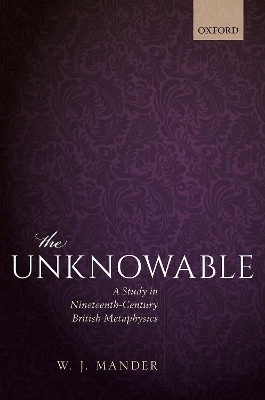
The Unknowable
A Study in Nineteenth-Century British Metaphysics
Seiten
2020
Oxford University Press (Verlag)
978-0-19-880953-1 (ISBN)
Oxford University Press (Verlag)
978-0-19-880953-1 (ISBN)
W. J. Mander presents a history of metaphysics in nineteenth-century Britain. He traces the story of the development and interplay of three great schools of thought, the agnostics, the empiricists, and the idealists, and their different responses to the idea of an ultimate but unknowable way that things really are in themselves.
W. J. Mander presents a history of metaphysics in nineteenth-century Britain. The story focuses on the elaboration of, and differing reactions to, the concept of the unknowable or unconditioned, first developed by Sir William Hamilton in the 1829. The idea of an ultimate but unknowable way that things really are in themselves may be seen as supplying a narrative arc that runs right through the metaphysical systems of the period in question. These thought schemes may be divided into three broad groups which were roughly consecutive in their emergence but also overlapping as they continued to develop. In the first instance there were the doctrines of the agnostics who developed further Hamilton's basic idea that fundamental reality lies for the great part beyond our cognitive reach. These philosophies were followed immediately by those of the empiricists and, in the last third of the century, the idealists: both of these schools of thought--albeit in profoundly different ways--reacted against the epistemic pessimism of the agnostics. Mander offers close textual readings of the main contributions to First Philosophy made by the key philosophers of the period (such as Hamilton, Mansel, Spencer, Mill, and Bradley) as well as some less well known figures (such as Bain, Clifford, Shadworth Hodgson, Ferrier, and John Grote). By presenting, interpreting, criticising, and connecting together their various contrasting ideas, this book explains how the three traditions developed and interacted with one another to comprise the history of metaphysics in Victorian Britain.
W. J. Mander presents a history of metaphysics in nineteenth-century Britain. The story focuses on the elaboration of, and differing reactions to, the concept of the unknowable or unconditioned, first developed by Sir William Hamilton in the 1829. The idea of an ultimate but unknowable way that things really are in themselves may be seen as supplying a narrative arc that runs right through the metaphysical systems of the period in question. These thought schemes may be divided into three broad groups which were roughly consecutive in their emergence but also overlapping as they continued to develop. In the first instance there were the doctrines of the agnostics who developed further Hamilton's basic idea that fundamental reality lies for the great part beyond our cognitive reach. These philosophies were followed immediately by those of the empiricists and, in the last third of the century, the idealists: both of these schools of thought--albeit in profoundly different ways--reacted against the epistemic pessimism of the agnostics. Mander offers close textual readings of the main contributions to First Philosophy made by the key philosophers of the period (such as Hamilton, Mansel, Spencer, Mill, and Bradley) as well as some less well known figures (such as Bain, Clifford, Shadworth Hodgson, Ferrier, and John Grote). By presenting, interpreting, criticising, and connecting together their various contrasting ideas, this book explains how the three traditions developed and interacted with one another to comprise the history of metaphysics in Victorian Britain.
W.J.Mander is Professor of History of Modern Philosophy at Oxford University, where he is a Fellow of Harris Manchester College.
Introduction
Part I: The Unconditioned
1: Sir William Hamilton
2: Henry Longueville Mansel
3: Herbert Spencer
4: Thomas Henry Huxley
Part II: Empiricist Objections
5: John Stuart Mill
6: Alexander Bain and George Croom Robertson
7: Shadworth Hollway Hodgson and William Kingdon Clifford
8: G.H.Lewes and Karl Pearson
Part III: Idealist Objections
9: James Frederick Ferrier
10: John Grote and James Hutchinson Stirling
11: The British Idealists
12: F.H.Bradley
Bibliography
| Erscheinungsdatum | 03.01.2020 |
|---|---|
| Verlagsort | Oxford |
| Sprache | englisch |
| Maße | 163 x 236 mm |
| Gewicht | 680 g |
| Themenwelt | Geisteswissenschaften ► Philosophie ► Geschichte der Philosophie |
| Geisteswissenschaften ► Philosophie ► Metaphysik / Ontologie | |
| Geisteswissenschaften ► Philosophie ► Philosophie der Neuzeit | |
| ISBN-10 | 0-19-880953-0 / 0198809530 |
| ISBN-13 | 978-0-19-880953-1 / 9780198809531 |
| Zustand | Neuware |
| Haben Sie eine Frage zum Produkt? |
Mehr entdecken
aus dem Bereich
aus dem Bereich
die kolonialen Wurzeln der französischen Theorie
Buch | Hardcover (2024)
Matthes & Seitz Berlin (Verlag)
28,00 €
eine Geschichte der Zuversicht von Homer bis zum Klimawandel
Buch | Hardcover (2024)
C.H.Beck (Verlag)
28,00 €


